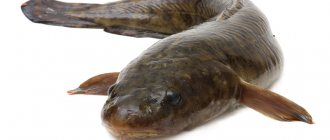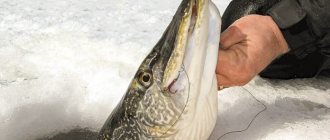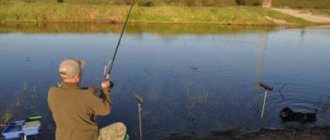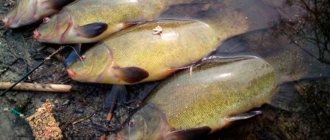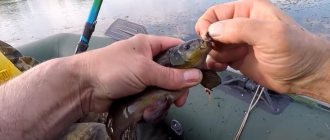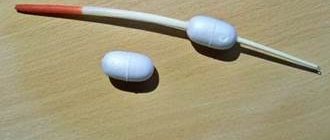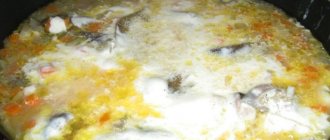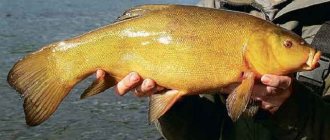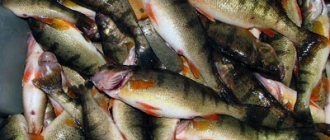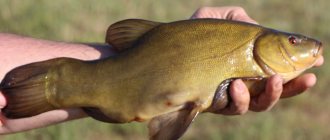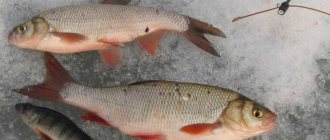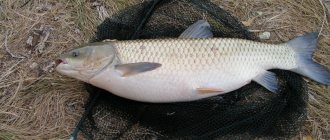Fishing for tench in the winter season is considered exotic. This cautious lazy fellow is capricious in the summer, but here it is winter and ice.
In short, by all indications, tench should not be taken during the ice period.
Nevertheless, such fishing exists and tench are caught quite effectively in some places. The whole answer to such effectiveness lies in the accumulation of these fish in large quantities in wintering pits. But in wintering pits the fish simply stand in suspended animation and do not feed - there is such a generally accepted opinion. To some extent this is true. In winter, tenches are very inactive. But they still have to feed. They are living organisms, and cold water also requires strength to combat the low temperature. And from time to time, tench have periods of active feeding. Most often, like carp and crucian carp, they coincide with periods of warming and long thaws.
Where and what does tench feed in winter?
To feed, tench go to places of former spring, summer and autumn activity, that is, to relatively shallow areas, densely overgrown with vegetation. Some part of the vegetation lives and develops quite normally in winter, but the grass that was on the surface of the reservoir falls to the bottom and rots. Vegetation decomposing at the bottom makes the water warmer in such places. This is precisely what creates the conditions for the tench to go out for fattening. In fallen grass there are many different insects that are underwater scavengers and scavengers. This is what tench feed on in winter. Therefore, residents of villages located on the banks of tench reservoirs and experienced visiting fishermen know such places, since they successfully catch tench there in open water. On the ice, it turns out that the tenches also come out here, into their warm kitchens. They only return to their wintering pits to sleep and be lazy.
Tackle and tactics for catching tench in winter
To catch tench, winter fishing rods with a nod are used. Catching tench with winter fishing rods that are equipped with a bite alarm such as a float is less successful. Rod and reel make no difference, the main thing is that you are comfortable.
The fishing line is used no thicker than 0.12 mm. Otherwise, you risk alerting the fish and not seeing the long-awaited bite at all. In the cold season, the water is as clear as possible and using rough gear is unwise.
It is advisable to have several winter fishing rods in your arsenal - about 5 pieces, maybe more. The fact is that the best tactic for catching tench in winter is to use active play with one rod and inactively fish with several others. Tench can bite on any of these fishing rods, but if the tench suddenly likes the active bait, you won’t go wrong. In addition, during active fishing with one of the fishing rods, your bait will not be missed by any other passing fish, and an additional catch is always nice.
For active fishing, jig tackle is used with bloodworms attached to it. Rods for inactive fishing are equipped with a dung worm, the favorite food of tench. The equipment for worm fishing in winter is similar to summer equipment - a regular shotgun weight with a leash on which a small hook is located. It is better to catch the worm entirely so that it is clearly visible to the tench.
Typically, anglers who hunt tench every winter drill a hole half a meter apart from each other in an arc, as if in a semicircle. This makes it easier to have all the gear in sight and notice a bite on any of them. It is important to calculate the number of gears that you can keep track of. Usually this is 5 winter fishing rods, less often - 7-8. Although, often the tench hooks itself, and then timely hooking is not so important, but still, having noticed a bite, it is better to immediately hook it so that the tench sits well on the hook and does not come off it when fishing. You can’t rush, so that the tench doesn’t tear the thin tackle. Very often in winter you come across trophy tenches, so fish out the tench carefully, without haste, and always have a hook with you in case the tench does not fit into the hole.
Where to catch tench in winter?
Fishing places, as we have already found out, are shallow grassy patches among deeper plateaus and wintering holes. And usually these places are located in river bays, in wide oxbow lakes, in the vast expanses of large ponds and lakes. However, the bottom in such places does not necessarily have to be covered with a thick layer of silt. It turns out, contrary to legends, tenches live normally in areas of the reservoir with a fairly hard bottom, barely covered with a thin layer of silt. The main thing is that in such places there is a lot of underwater vegetation. It is best when there are thickets of reeds nearby and the water is covered with duckweed in summer.
Tench along the first and outer ice
If we talk about fishing on first ice, then often there is no need to look for places with vegetation. All the grass is still at the top and it, frozen in the ice, is clearly visible as is. This is where you should look for tench. Usually, the best places, as in summer, are windows and gaps among the grass. During the period of spring and extreme ice, when tench lines are also active, you just need to know such places by studying the reservoir in advance or interviewing local residents.
Features of catching tench from ice
Tench is a very interesting fish and many anglers enjoy fishing for this bronze lump. Targeted fishing for tench
possible not only in summer, but also in winter.
But still, in winter, many fishing enthusiasts have some difficulties associated with catching this fish. However, such difficulties can be avoided if you use the advice and recommendations of anglers who are well versed in tench fishing, both in summer and winter. Tench, like crucian carp, buries itself in the silt for the winter, like crucian carp, and hibernates. However, in the reservoirs of southern Russia, this fish behaves somewhat differently in winter, if winter is not marked by severe cold. Also, ice fishing for tench
is possible in central Russia, especially during the thaw period. However, during the thaw period, tench are caught both in the Urals and Altai.
However, many fishermen mistakenly believe that tench cannot be caught in winter and that it is completely passive until the ice is removed from the reservoirs. But this is far from true. And tench, depending on the nature of the reservoir and its geographical location, can feed quite actively. It is this factor that makes it possible to catch tench from the ice. But catching tench in winter requires good preparation. Indeed, in this matter, it is of great importance to properly prepare the bait, bait and tackle, and it is very important to collect the most necessary information about the reservoir where the tench lives and where it is supposed to be caught.
Despite the fact that tench belongs to the carp family, it has quite significant differences from its relatives. The seemingly awkward body shape of the tench can be misleading and one gets the impression that this fish is inactive and clumsy. But experienced fishermen who perfectly know the price of this fish and know how fast and strong it is. In addition, tench can reach significant sizes (up to 80 cm) and weight (about 7 kg)
The tench's body outwardly has the appearance of a hulking hulk because the tench's thick body is crowned with a short tail. This fish has rather small scales. And the skin is very dense. The fins are smoothly rounded and do not have a specific color. The color of this fish depends on the environment in which the tench lives. This includes the level of illumination, the composition of the bottom soil, and the types of aquatic grass. The back of the fish often has a dark greenish tint; as for the sides, they most often have a greenish-olive color. In view of the above-described properties of the tench’s body, this fish can hardly be confused with any other fish.
Of course tench fishing in winter
has not received widespread use. After all, in nature, tench is found much less frequently than, for example, its relative and competitor crucian carp. Since this fish is heat-loving, the further south the reservoirs are, the more tench live there. And the further north they are located, the less common it is.
Looking for tench in rivers is not very promising. However, you can also find it there if you know exactly where it winters. But generally, tench go to oxbow or floodplain lakes for the winter. catch tench from the ice during the thaw period.
. But let's return to the rivers.
On rivers, the main criterion for choosing a tench fishing point is that this place is rich in a wide variety of vegetation. In such places, tench hides from predators, primarily from pike, and there is also a lot of different food for it. Therefore, you need to know the features of the reservoir quite well. This will help you quickly find the paths along which the tench moves.
It is also necessary to pay close attention to remote lakes that do not have connections with rivers. In such reservoirs, tench feels very comfortable. After all, this fish is able to survive for a long time in conditions of lack of oxygen. In such places, catching tench from ice
can be very successful. In addition, in winter, getting to such places is quite problematic, and not every angler will look for such a body of water.
Fishing for tench in the summer season is significantly different from catching it in the winter. This fact applies to all winter fishing accessories, from gear to equipment. Therefore, it is useful for an angler who wants to catch tench in winter, but does not yet have experience, to know this.
Anglers with experience in fishing for tench in winter note that in winter there are good moments that make it possible to catch a sufficient amount of this fish. Also, the size of the catch in winter can pleasantly surprise even an experienced fisherman. The gear for ice fishing for tench is quite simple, but the fishing technique and strategy are no different.
Fishing for tench in winter
, like any other fish, has its own characteristics. First of all, this is the strong influence of weather conditions on this fish. Typically, tench actively feed on calm and sunny days, which are ideal for fishermen. And if it’s wet snow or rain, it’s cloudy and the wind is blowing, then tench fishing is futile. You need to catch other fish or refrain from fishing altogether if you want to catch tench.
Some anglers who like ice fishing believe that tench, like crucian carp, buries itself in the silt for the winter and hibernates until spring. Of course, this approach is true for many reservoirs. But as already mentioned above, the further south the geography of the reservoir is, the more likely it is to ice fish for tench. But even in those reservoirs where tench are not active for a significant period of time in winter, it is quite possible to catch them during the first ice period and on the last ice.
Just like in summer, in winter the tench fishing area should be well fed. The composition of the bait mixture should not be overly saturated with strongly flavored odors. Also, the bait should not be too high in calories. Otherwise, the fish will be well fed and will simply begin to ignore baits and baits.
Experienced fishermen recommend the following bait recipe for tench: 120-150 g of breadcrumbs, 1-2 handfuls of food bloodworms and 1 handful of maggots. 120 g of roasted seeds and soil 0.5-0.6 kg. It is better not to add flavorings. It should be remembered. that when the upper layers of water warm up and a constant pressure is established, the tench begins to periodically go out for short feedings.
Winter tench fishing
can occur on a wide variety of baits and baits. After all, tench feed on a wide variety of foods. The tench's diet consists of various larvae, worms, mollusks, crustaceans, especially tench, which likes to feast on young shoots of aquatic vegetation and filamentous algae. Since tench come out to feed for a short time in winter, you need to very carefully choose the places where this fish stands.
When fishing for tench in winter, various combinations of baits perform well. For example, maggots can be combined with bloodworms or amphipods. Such baits attract tench more often than usual. And this should always be used when catching it.
Happy fishing!
When catching tench you need to start with bait
It is best to throw it onto a prepared place under the hole. If in the summer such “tables” for tench are mowed with a scythe and sand is poured from the boat, then along the ice you can pull out some part of the grass with a large tee with a weight and pour the sand into the hole. You will end up with a small sandy patch among the thick grass. Tenches come to such “tables” more willingly than just into thickets of vegetation where bait has been thrown or on clean edges.
The bait can be soil bought in a store as a bait filler and collected from mole holes. This is shallow soil where you need to place finely chopped worms. In addition, cottage cheese squeezed out in gauze is used. If bloodworms are supposed to be used as bait, then they should also be part of the bait. In order to deliver crumbly bait to the bottom, cone-shaped feeder dump trucks are used. Or binders are added to the bait: clay, oatmeal, flour. Then the bait sinks to the bottom in the form of balls.
